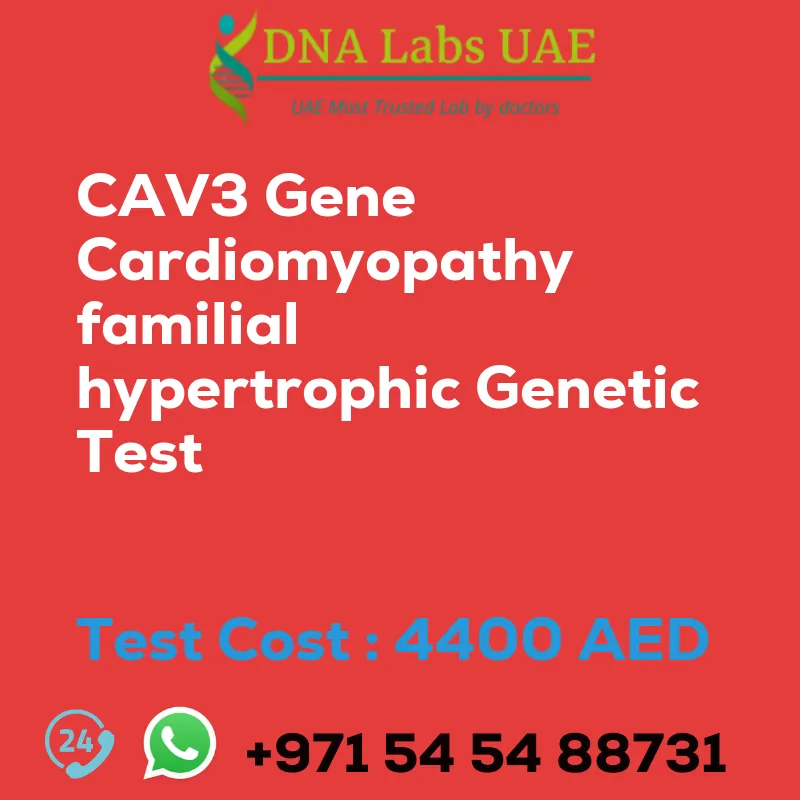CAV3 Gene Cardiomyopathy Familial Hypertrophic Genetic Test
Introduction
CAV3 gene cardiomyopathy, also known as familial hypertrophic cardiomyopathy (FHC), is a genetic disorder characterized by the thickening of the heart muscle, leading to impaired heart function. It is caused by mutations in the CAV3 gene, which provides instructions for producing a protein called caveolin-3. This protein is involved in the formation of caveolae, small invaginations in the cell membrane that play a role in cell signaling.
About the Test
A NGS genetic test, also known as next-generation sequencing, is a type of genetic test that can analyze multiple genes simultaneously. In the case of familial hypertrophic cardiomyopathy, a NGS genetic test can be used to identify mutations in the CAV3 gene, as well as other genes associated with the condition. The test involves collecting a blood or saliva sample from the individual being tested. The DNA in the sample is then sequenced, and the resulting data is analyzed to identify any genetic variants or mutations in the CAV3 gene.
Test Details
- Test Name: CAV3 Gene Cardiomyopathy Familial Hypertrophic Genetic Test
- Components: NGS Technology
- Price: 4400.0 AED
- Sample Condition: Blood or Extracted DNA or One drop Blood on FTA Card
- Report Delivery: 3 to 4 Weeks
- Test Type: Cardiovascular Pneumology Disorders
- Doctor: Cardiologist
- Test Department: Genetics
- Pre Test Information: Clinical History of Patient who is going for CAV3 Gene Cardiomyopathy, familial hypertrophic NGS Genetic DNA Test. A Genetic Counselling session to draw a pedigree chart of family members affected with CAV3 Gene Cardiomyopathy, familial hypertrophic NGS Genetic DNA Test gene CAV3
Benefits of the Test
Genetic testing for CAV3 gene cardiomyopathy can be beneficial for individuals with a family history of the condition, as it can provide important information about their risk of developing the disease. It can also help in making informed decisions about medical management and treatment options.
Important Considerations
It is important to note that genetic testing for CAV3 gene cardiomyopathy should be done under the guidance of a healthcare professional or genetic counselor who can provide appropriate counseling and support. They can also help interpret the results and provide information about the implications for the individual and their family members.
| Test Name | CAV3 Gene Cardiomyopathy familial hypertrophic Genetic Test |
|---|---|
| Components | |
| Price | 4400.0 AED |
| Sample Condition | Blood or Extracted DNA or One drop Blood on FTA Card |
| Report Delivery | 3 to 4 Weeks |
| Method | NGS Technology |
| Test type | Cardiovascular Pneumology Disorders |
| Doctor | Cardiologist |
| Test Department: | Genetics |
| Pre Test Information | Clinical History of Patient who is going for CAV3 Gene Cardiomyopathy, familial hypertrophic NGS Genetic DNA Test. A Genetic Counselling session to draw a pedigree chart of family members affected with CAV3 Gene Cardiomyopathy, familial hypertrophic NGS Genetic DNA Test gene CAV3 |
| Test Details |
CAV3 gene cardiomyopathy, also known as familial hypertrophic cardiomyopathy (FHC), is a genetic disorder characterized by the thickening of the heart muscle, leading to impaired heart function. It is caused by mutations in the CAV3 gene, which provides instructions for producing a protein called caveolin-3. This protein is involved in the formation of caveolae, small invaginations in the cell membrane that play a role in cell signaling. A NGS genetic test, also known as next-generation sequencing, is a type of genetic test that can analyze multiple genes simultaneously. In the case of familial hypertrophic cardiomyopathy, a NGS genetic test can be used to identify mutations in the CAV3 gene, as well as other genes associated with the condition. The NGS genetic test involves collecting a blood or saliva sample from the individual being tested. The DNA in the sample is then sequenced, and the resulting data is analyzed to identify any genetic variants or mutations in the CAV3 gene. This information can help in diagnosing familial hypertrophic cardiomyopathy and assessing the risk of developing the condition in family members. Genetic testing for CAV3 gene cardiomyopathy can be beneficial for individuals with a family history of the condition, as it can provide important information about their risk of developing the disease. It can also help in making informed decisions about medical management and treatment options. It is important to note that genetic testing for CAV3 gene cardiomyopathy should be done under the guidance of a healthcare professional or genetic counselor who can provide appropriate counseling and support. They can also help interpret the results and provide information about the implications for the individual and their family members. |








